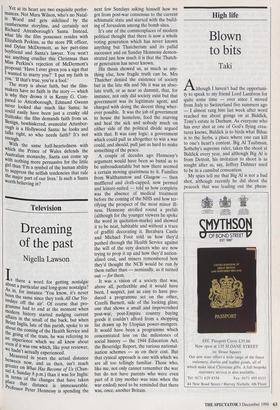Television
Dreaming of the past
Nigella Lawson
Is there a word for getting nostalgic about a particular and long-gone nostalgia? As in, for instance 'You know, it's never been the same since they took All Our Yes- terdays off the air'. Of course that pro- gramme had to end at the moment when modern history started nudging current affairs in the small of the back, but when Brian Inglis, late of this parish, spoke to us about the coming of the Health Service and the going of the tram, he was referring to art experience which we all knew about even if it was one which, like your reviewer, We hadn't actually experienced. , Measured in years the actual distance between now, and us then, isn't much greater on What Has Became of Us (Chan- nel 4, Sunday 8 p.m.) than it was for Inglis: in terms of the changes that have taken Place that distance is immeasurable. Professor Peter Hennessy is spending the next few Sundays asking himself how we got from post-war consensus to the current schismatic state and started with the build- ing of Jerusalem among the bomb sites.
It's one of the commonplaces of modern political thought that there is now a whole voting generation which has never known anything but Thatcherism and its pallid successor and on Sunday Hennessy demon- strated just how much it is that the Thatch- er generation has never known.
His thesis showed us, as much as any- thing else, how fragile truth can be. Mrs Thatcher denied the existence of society but in the late 40s and 50s it was an abso- lute truth, or as near as dammit, that, for instance, not only did society exist but that government was its legitimate agent, and charged with doing the decent thing wher- ever possible. It was the job of government to house the homeless, feed the starving and heal the sick and nobody much on either side of the political divide argued with that. It was easy logic: a government which could pull us altogether to win a war could, and should, pull just as hard to make something of the peace.
A couple of decades ago Hennessy's argument would have been so banal as to be unbroadcastable but now there seemed a certain moving quaintness to it. Families from Walthamstow and Glasgow — then mufflered and cloth-capped, now permed and leisure-suited — told us how complete was the absence of medical treatment before the coming of the NHS and how ter- rifying the prospect of the most minor ill- ness. Hennessy strolled round a prefab (although for the younger viewers he spoke the word in quotation-marks) and showed it to be neat, habitable and without a trace of graffiti decorating it. Barabara Castle and Michael Foot told us how they'd pushed through the Health Service against the will of the very doctors who are now trying to prop it up and how they'd nation- alised coal, and miners remembered how they'd thought the NCB would be run by them rather than — nominally, as it turned out —for them.
It was a vision of a society that was, above all, perfectible and it would have been, I suspect, just as easy to have pro- duced a programme set on the other, Corelli Barnett, side of the looking glass; one that shows a small and impoverished post-war, post-Empire country buying goods it couldn't afford from a shopping list drawn up by Utopian power-mongers. It would have been a programme which concentrated less on the milestones of social history — the 1944 Education Act, the Beveridge Report, the various national- isation schemes — as on their cost. But that cynical approach is one with which we are all too tellingly familiar. Those who, like me, not only cannot remember the war but do not have parents who were even part of it (my mother was nine when the war ended) need to be reminded that there was, once, another Britain.










































































 Previous page
Previous page